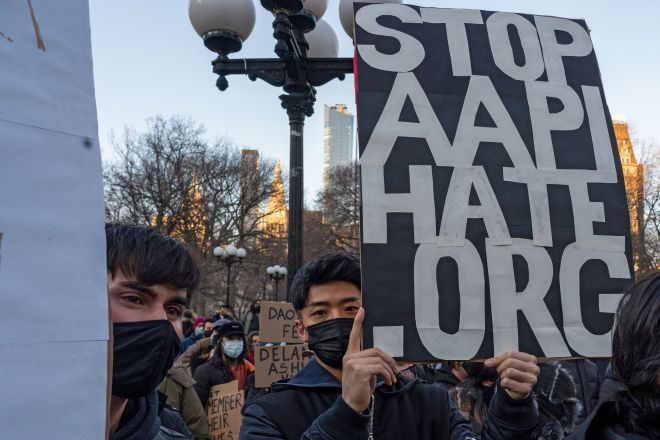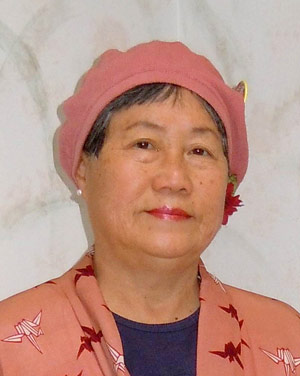Asian American Pacific Islander (AAPI) Hate Incidents: A Personal Report
Published on May, 15 2021
A protester holds up a sign at a peace vigil to honor victims of attacks on AAPI people in Union Square Park on March 19, 2021, in New York City. Photo credit: Ron Adar/Shutterstock.com.
By Shirley Lin Kinoshita
Lifetime Member, San Jose Branch
May 2021
As an Asian American I view with concern, but not surprise, the surge of hate incidents against the AAPI (Asian American Pacific Islander) community in our nation. There have been almost 4,000 incidents of hate reported against Asian American Pacific Islanders since COVID-19 lockdowns started in February 2020 according to Stop AAPI Hate which monitors reported incidents of racism and discrimination.
Our nation’s relation to the AAPI community has a long and complex history. Since the mid-19th century, Chinese laborers were considered undesirables with filthy habits who tried to take jobs away from white Americans. Many Chinatowns were burned to the ground and their inhabitants driven out of town in the 19th and early 20th century. In the San Jose region where I live, four Chinatowns were destroyed.
In March 2021 the killing of six Asian women in Atlanta, GA, brought to the forefront the longtime issue of misogyny particularly targeting Asian women. Few Americans know about the Page Act of 1875 which prohibited all Chinese women (assumed to be prostitutes) from coming to the United States. This law predates the better known Chinese Exclusion Act of 1882 which banned all Chinese workers.
 I am a child of immigrant Chinese parents. My father came to this country in 1923, moving to Hawaii from Canton Province for better opportunities. I, like many born here, have always felt that I was a full-fledged American and also a “perpetual foreigner.” As a university history major my senior thesis in 1965 was about the Chinese Exclusion Act of 1882, which prohibited all immigration of Chinese laborers. My parents couldn’t become naturalized citizens and onerous taxes were levied on those who did work in the United States. I remember my father, the third generation in his family to work in Hawaii, saying he had to pay a head tax in order to work because he was Chinese.
I am a child of immigrant Chinese parents. My father came to this country in 1923, moving to Hawaii from Canton Province for better opportunities. I, like many born here, have always felt that I was a full-fledged American and also a “perpetual foreigner.” As a university history major my senior thesis in 1965 was about the Chinese Exclusion Act of 1882, which prohibited all immigration of Chinese laborers. My parents couldn’t become naturalized citizens and onerous taxes were levied on those who did work in the United States. I remember my father, the third generation in his family to work in Hawaii, saying he had to pay a head tax in order to work because he was Chinese.
Photo of Shirley Lin Kinoshita, used with her permission.
My husband’s Japanese Canadian family suffered similar types of discrimination. Kim Kinoshita spent his first four years after his birth in Japanese Detention camps with his family during World War II. He and thousands of other Japanese were designated as ‘enemy aliens’ who were deemed to be a threat and undesirables. Like many other Japanese, my husband’s family lost most of their possessions, but were eventually given reparations after concerted legal efforts to receive compensation.
The arrival of the COVID-19 pandemic in 2020 proved an opportune time for political leaders like then-President Donald Trump to use inflammatory racist language to accuse China of deliberately bringing the “China flu” to infect and harm Americans. Racist incidents against Asian Americans increased dramatically due to these remarks and they continue to this day. While most incidents, over 60%, have involved verbal abuse, many AAPI elderly and women victims have suffered physical injuries and even death. Women have reported 2.3 times more incidents than men, and misogyny is part of the racism that is experienced by AAPI women.
Several nonprofits like Asian Americans Advancing Justice and Stop AAPI Hate have been working on remedies. Among the most promising are the free Bystander Intervention Training (hosted by Hollaback!) sessions that offer a toolkit of ways to respond if witnessing a racist incident. I’ve included a few resources on AAPI history and ways you can help at the end of this article. At the least, your speaking out against racism makes a difference, like in the Black Lives Matter movement.
I’m pleased to see that the US Senate passed on April 22, 2021 by a 94-1 bipartisan vote S.937, the COVID-19 Hate Crimes Act, introduced by Sen. Mazie Hirono (D-Hawaii). The legislation will go on to the House as H.R 1843 and will likely also be approved. I find this a hopeful sign of equanimity among our nation’s political leaders.
As we move forward as a nation to address our long history of racism against people of color, I believe that more of us in peace and justice organizations like WILPF will come forward to educate themselves, speak up, and help change these systemic hate issues to make justice, social reform, and equal opportunity possible for all.
If you want to learn more about what interests me, my blog can be found at sumieblog.wordpress.com. I share my art and thoughts about art, living, and faith.
Resources on Asian American History and Stopping Hate Crimes
- Asian American History in 4 Minutes: Reaching back to the late 1500s, has collected and made accessible a visual representation of some of the important events crucial to the Asian-American identity. The Generasian blog includes articles, videos, and a biannual magazine.
- PBS Special on Asian Americans by Ken Burns, a 5-hour series.
- Asian Americans Advancing Justice - Numerous resources and links are available on this site. My favorite is: Resources for the Asian American Community on Anti-Blackness.
- Stop AAPI Hate: At Stop Asian American Pacific Islander Hate, you can report a hate incident and find news articles and reports. For example: “How to stop the dangerous rise in hatred targeted at Asian Americans,” an op-ed posted online to USA Today on March 30, 2021, by three cofounders of StopAAPIHate, Manjusha Kulkarni, Cynthia Choi, and Russell M. Jeung.
- “In Rare Moment of Bipartisan Unity, Senate Approves Asian American Hate Crimes Bill”, posted to www.npr.org by Congressional Reporter Claudia Grisales on April 22, 2021.
- How to Support the AAPI Community: This April 25, 2021, Facebook page by Lindsay Wang, Associate Editor for AsAmNews, provides a resource guide to supporting the AAPI community.



